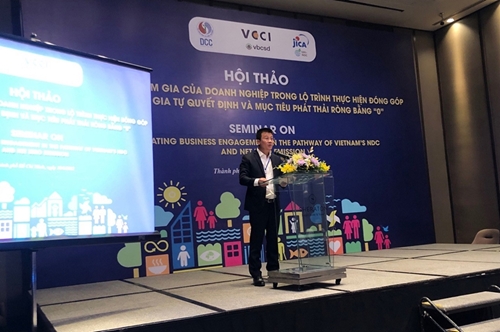Following the rising global momentum for implementation of Nationally Determined Contributions (NDC) and domestic policy direction towards carbon neutrality by 2050, the seminar gathered key policy makers from relevant ministries, leaders of business associations, key CEOs, managers and representatives from both foreign and domestic enterprises based in Vietnam.
    |
 |
|
Nguyen Tuan Quang, Deputy Director of Department of Climate Change of MONRE |
More than 100 participants engaged in a vigorous discussion on the private sector’s role in realizing the national climate change targets of Vietnam, including NDC by 2030 and the long-term carbon neutrality direction by 2050.
The seminar provided a valuable opportunity for MONRE to inform development partners and business sectors the most recent policy update, direction and regulatory requirements for implementing mitigation including NDC in Vietnam.
JICA’s technical cooperation project on “Support for Planning and Implementation of the Nationally Determined Contributions in Vietnam (SPI-NDC)” also shared with the audience the upcoming business training opportunities available to build technical capacities of enterprises who are subject to facility GHG reporting system being developed with support from Japanese experts.
Nguyen Tuan Quang, Deputy Director of Department of Climate Change of MONRE expressed the importance of JICA’s support through SPI-NDC and stressed that “the seminar definitely epitomizes the Government-Business (G-to-B) partnership between MONRE, other line ministries, VCCI in cooperation with JICA’s SPI-NDC project in facilitating private sector engagement in NDC implementation and beyond.”
Nguyen Tien Huy, Director of the Office for Business Sustainable Development of VCCI emphasized the important role of the business community for Vietnam to achieve its GHG mitigation targets.
In his speech, Murooka Naomichi, JICA Vietnam’s Senior Representative affirmed that through SPI-NDC project, JICA would continue to provide opportunities for both capacity building and dialogue among key actors to consolidate the partnership between government and business.
In recognition of the necessity of leveraging private finance for climate actions in Vietnam, JICA also introduced numerous support schemes available to support different types and sizes of private sector activities in reducing emissions, including the Private Sector Investment Finance (PSIF) such as the 144-MW Quang Tri Wind Power Project and the Japanese Enterprise Proposing Program Scheme such as the Project with Osumi Co., Ltd. which disseminates Japanese Technologies for Energy Saving Analysis and Improvement by Simplified Energy Measurement in Vietnam.
Translated by Chung Anh